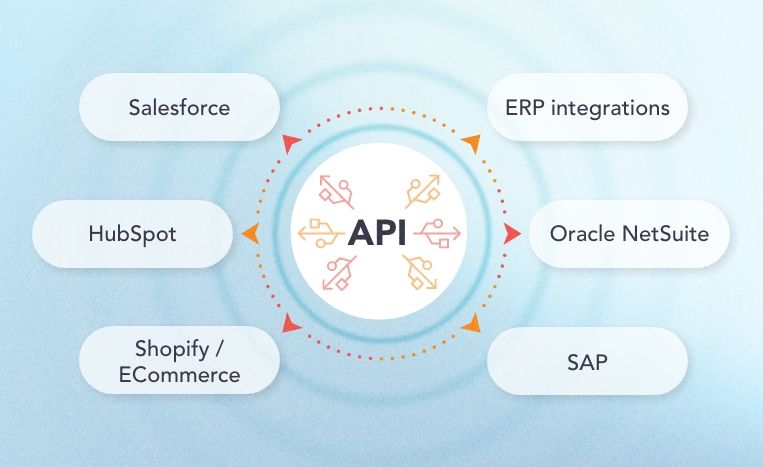6 Ways API Integrations Impact Your Digital Presence
04.17.23
“API” is a term thrown around often in technical spheres. To non-technical folks, it means nothing more than an acronym. However, API integrations are crucial business tools in the digital age — especially those involving e-commerce. As a web design and development firm, Paradigm handles integrations for clients across diverse industries.
As a resource, we’re diving into terms and software applications you may encounter as you elevate your website.
API Integrations Defined
An application programming interface (API) is a set of subroutine definitions, protocols and tools for building application software. An API integration is the connection of two or more applications through an API. The integration allows software components to communicate back and forth through data and metadata.
The simplest technological example of these integrations is the interaction between Facebook and Instagram. While they are two separate applications on your phone, APIs enable them to share applicable information with one another, such as an individual’s username, password and contacts. Essentially, they act as business tools that share data.
At their most basic level, website design and development firms use API integrations to pass information to the right destination. Their invisible communication process enables the smooth operation between external applications and your website without human interaction. APIs allow real-time data transfers — they could transform coordinates into pins on a map, send purchase information to a bank, change inventory numbers and perform other functions behind the scenes.
APIs can have different data exchange formats, such as REST and SOAP. These provide a standardized set of constraints, properties and architecture for applications to exchange data in a consistent and expected interaction. With varying functions and connected applications, your integration needs may vary — many businesses turn to a web development firm to handle the details.
Common API Integrations
1. Salesforce
Salesforce is a popular customer relationship management software (CRM) that helps businesses organize and retain contacts, prospects and leads. In our work as a website design and development firm, our team often uses API integrations to connect a business website to a Salesforce account. The platform is a network of connected applications that may use APIs in numerous ways — for example, APIs may integrate with a lead form on your website. From there, an API would allow your website to automatically send current contact information to Salesforce for email lists and other functions.
It’s worth noting that Salesforce is known as a sophisticated yet complex platform with a high price tag. Many businesses may defer to simpler business tools, such as HubSpot.
2. HubSpot
HubSpot is another popular CRM software that manages marketing automation processing and helps businesses organize client libraries, engagements and other specific account data. This platform is known to be user-friendly, with less of a learning curve compared to Salesforce. For budget-conscious businesses, HubSpot may be the preferred software.
As with Salesforce, our website design and development team helps you identify the data you must pass between HubSpot and other systems. APIs allow a quick transfer of contacts, dates and information related to the sales process from your website to your Hubspot database.
3. Shopify / E-commerce
API integrations are crucial for e-commerce platforms — they drive businesses to display information about consumers and their orders as they are collected. Shopify is an all-in-one e-commerce platform often used by small-scale businesses.
You may integrate Shopify with multiple business tools such as Mailchimp, social media accounts and Google Analytics. Our developers help you narrow down the platforms you wish to connect to and ensure they communicate smoothly.
4. ERP integrations
Enterprise resource planning (ERP) software automates day-to-day business processes such as accounting, procurement, invoicing, order-to-fulfillment and other procedures. Without an ERP, your business would have to utilize more labor hours so workers could manually update factors such as inventory numbers.
Our website design and development team connects your ERP software with multiple other systems, tailoring data communications to meet your goals. If necessary, our developers may help you build your own core API integrations by interfacing an application’s API data schema with the ERP system.
5. Oracle NetSuite
Oracle NetSuite is a Software as a Service (SaaS) — it merges accounting, ERP tools, CRM tools and e-commerce capabilities into one package. As an all-encompassing software, NetSuite reduces the need to connect separate ERP, e-commerce and CRM functions.
However, this business tool accumulates enterprise data over time and requires you to integrate it with on-premises website software. Our developers help you navigate the integration of your properties with NetSuite through various means, including developing custom API integrations.
6. SAP
SAP stands for System Analysis Program Development. This software centralizes information for planning, operations, supply chain management and financials. SAP integration occurs when website design and development firms use an integration platform to connect SAP systems to external systems.
Essentially, SAP integrations merge on-premises and cloud-based applications seamlessly, taking data and instantly making it readable and usable in SAP.
Developing a Strategy for API Integrations
As a business, you must utilize API integrations to streamline digital organization and data collection. With these business tools, you save time and money while you find ways to refine your business strategy. Evaluating which APIs are fit for your business may seem complicated, and correctly setting up supporting technology may feel almost impossible.
Having a website design and development partner who understands the intricacies of these platforms will streamline software setup. Contact Paradigm today to begin developing an API strategy that will best fit your business goals.


